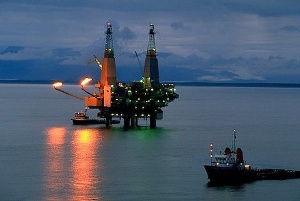Traditional and political leaders in the Western Region(W/R) have, at a National Stakeholders’ Forum, to review the implementation of the Petroleum Revenue Management Act of 2011, Act 815, reiterated the desire to have at least 10% of Ghana's oil revenue spent on the region.
Speaking on behalf of the Western Regional House of Chiefs, the Vice President, Nana Kwesi Agyemang VIIII, said it was fair and natural justice that the Western Region be given what it is demanding, considering the level of poverty in the resource-rich region, and the fact that it is most likely to bear the negative impacts of the exploration and production activities.
Nana Kwesi Agyemang said he could not fathom government's refusal to grant the demand of the people of the Western Region when they contribute tremendously to the national revenue. He described the demand as an issue still burning in the hearts of chiefs and people of the Western Region and urged the government to reconsider its stance on the matter.
He stressed that the chiefs and people of the Western Region have not abandoned their desire for the 10% of the oil revenue. Contributing to the discussions, the Chair of the Parliamentary Select Committee, Hon. Kwabena Donkor, argued that though the principle of equity makes it imperative for frontline communities to benefit more from the resource, he disagreed with the 10% demand.
According to him, there are ten regions in Ghana so if the resource is shared equally, western region can only get 10%, an outcome that will not address the equity demand of the people. He will rather wish that, a case of specific development programmes and projects which would have multiple effects on the lives of the people.
“The theory of local content and local participation, I support. But it is how we articulate our arguments. Let's look at it again. How do we re-articulate the issue and achieve the same objective. The object is more important than the number,” he explained.
Both speakers were reacting to a statement by the Deputy Western Regional Minister who in a welcome address, suggested that the Western Region is yet to fully realise the contribution of the oil sector to the regional economy although revenues from the sector are already contributing to the national economy.
He explained that the region is yet to realize tangible benefits from the oil and gas industry because its lacks highly-skilled manpower needed to engage in the technical, administrative and managerial echelons of the oil industry.
“Many a time, extractive industries offer jobs to the catchment areas, but only the menial jobs. Such personnel have little or no input in decision making, thereby making the community worse off. The presence of local human resource in the managerial and administrative levels, who are involved in decision-making, is what will favour the local community. This calls for acquisition of skills in engineering, human resource management, law and the likes to equip the people to be relevant in the global oil and gas industry,” he stated.
Participants at the stakeholders’ forum generally agreed that government, as part of the petroleum revenue allocation, should consider prioritising projects in the Western Region, especially communities within the six coastal districts to address the demands being made by the chiefs and people of the region. The forum was organised by Friends of the Nation, with support of the German development co-operation organization.
Business News of Wednesday, 2 October 2013
Source: Public Agenda













